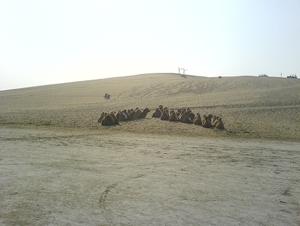China faces desertification
Sand Lake Yinchuan in Ningxia (image: XM&&LL/Flickr)
China’s Foreign Minister promised recently that his country would work with nations on a new climate change treaty, but he insisted that developed countries take the lead. Some experts say that China is now the world’s biggest emitter of carbon dioxide, which contribute to global climate change. That global climate change is coming home to roost in parts of Northern China. It is one of the factors causing the desert to creep in where farmland used to be.
There is a village in China’s autonomous region of Ningxia, about a mile from the ancient Great Wall, near the border with inner Mongolia. The sand dunes blew in here about a decade ago and people started leaving.
Just 26 families remain. They tend goats and try to eke out a living on unforgiving scrub land. One of the local farmers, Li Xing Fu has lived here for all of his 46 years, and he says it is raining less now than it used to. Li says, “This year we weren’t able to plant at all. There was no rain until harvest season. There has hardly been rain for five years.”
Lack of water is a farmer’s common lament in Ningxia, and throughout much of northern China. Decades of logging forests and overusing water has caused China’s deserts to expand by about 800 square miles each year. That, in turn, means that there is less water to evaporate and return as rain.
This is one of China’s poorest and driest regions, but it has one thing going for it–the Yellow River. A Senior Engineer with Ningxia’s Water Resources Bureau says, “We are doing our best to protect the Yellow River that flows through Ningxia. We all realize that without the Yellow River there would be no Ningxia. It’s our lifeline.”
Irrigation of rice fields uses a great deal of the river’s diverted flow. The shin-deep flooding of the fields is said by the locals to flush out the soil’s saltiness. However, agronomists have discovered that this irrigation is actually the root cause of the soil’s increases in salt content, rather than its purifying agent. This increase requires the farmers to use five times more fertilizer than the national average to make the land even half as productive. The fertilizer washes into the river and groundwater, polluting potable sources. Wells have to be sunk deeper and deeper to find suitable water.
Ningxia is faced with the option of reducing rice production in hopes of ending this cycle. But, by doing so, it would take away from farmers what is one of their most profitable crops, and thereby their livelihoods. Officials warn that changing this is a gradual process, and in the meantime, people’s immediate survival can’t be sacrificed to long-term environmental ideals.
But take that approach for too long, and you are back with Farmer Li. He looks at the sand dunes encroaching on his village, and wishes he could farm somewhere else.
PRI’s “The World” is a one-hour, weekday radio news magazine offering a mix of news, features, interviews, and music from around the globe. “The World” is a co-production of the BBC World Service, PRI and WGBH Boston.
